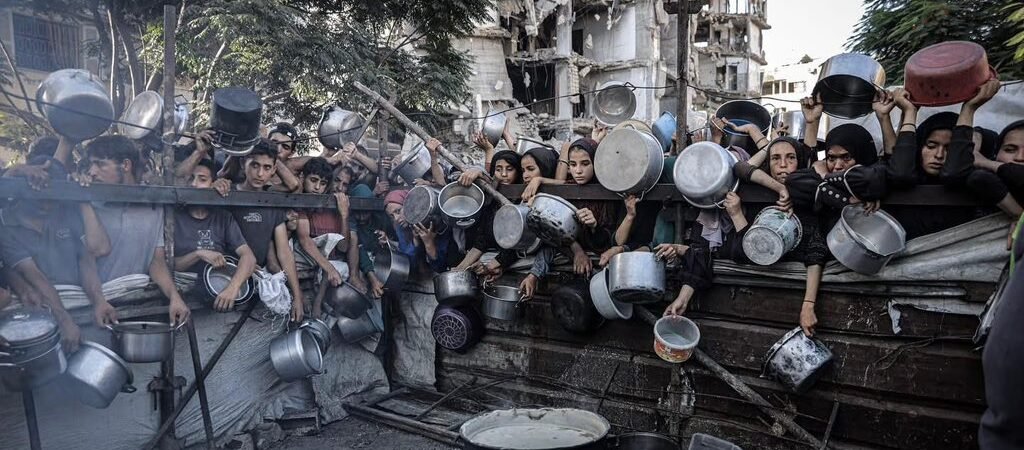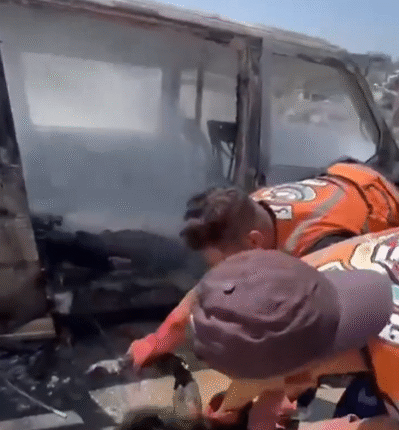Gaza’s humanitarian catastrophe reached a record new low. Almost half a million are already suffering under famine conditions and over a million others are at risk of starvation, according to a World Health Organization (WHO) report released on May 12, 2025. The 2.1 million Palestinians in total are paying the price for a long and inhuman blockade that undermined humanitarian aid and devastated basic food infrastructure.
It is not merely a lack of food it is a full blown crisis, driven by war, systemic restrictions and the collapse of essential infrastructure. Children are wasting away in hospital beds. Families go for days without food. In some areas of the nation, individuals subsist on weeds and filth water.
Ever since the renewed violence at the end of 2023, Gaza’s precarious food supply chains have been gradually ruined. Fields have been left fallow or plowed under. Greenhouses are devastated. Fishing, once a substantial source of food, is practically out of the question under naval blockade and bombardment. Bakeries and markets, meanwhile, are shut, bombed-out or empty.
The WHO notes that acute malnutrition is rising at an “alarming rate” among children under the age of five and pregnant women. Physicians are treating an increased number of patients with stunted development, compromised immunity, and hunger-fostered avoidable illness.
UNICEF and the World Food Programme jointly did an assessment in April 2025 and warned that without food availability, mass death is inevitable within a few months.
Under International Humanitarian Law (IHL) now reaffirmed by the International Committee of the Red Cross (ICRC) on 26 August 2024 warring parties are prohibited from targeting objects essential to civilian existence, like units for producing food, water installations, and lines of communication. But large-scale destruction of these very resources has been witnessed during the conflict.
Though straight-on bombings of food warehouses and farms are rare, the indirect ramifications of war, including the cutting off of electricity to water purification plants and blockades on relief convoys, have rendered Gaza’s food system unfunctional. UN officials characterize the land as now a “man-made famine zone,” reminiscent of Somalia, Sudan, and Yemen tragedies.
Humanitarian agencies, including Médecins Sans Frontières (MSF), the WFP, and the UN Office for the Coordination of Humanitarian Affairs (OCHA), have continually called for unobstructed humanitarian access to Gaza. They record regular delays, denials, and inspections of humanitarian convoys, however. Food aid is left to perish at border points, and fuel shortages have paralyzed transport.
“The blockade is suffocating Gaza,” said Dr. Rana Qudaih, a Palestinian doctor who works with MSF. “Even if it is a donation of food, we cannot deliver it because there is no fuel, no drivers, no safe roads. It is a slow death for the population.”
In the wake of outright and mounting evidence of humanitarian disaster, worldwide response has been sluggish and piecemeal. While some states and human rights groups have condemned the blockade and called for ceasefires, others continue to endorse policies resulting in Gaza’s isolation in the name of security issues.
The UN Security Council has been unable to pass a binding resolution to ensure access to aid, with the major powers either vetoing or abstaining. Parallel local campaigns, like the global hunger strike action organized by Palestinian solidarity groups, have sought to bring the crisis to public attention.
“Gazans aren’t starving because of a natural disaster,” said Francesca Albanese, UN Special Rapporteur on the situation of human rights in the Palestinian territories. “They are starving because they are being denied their right to exist. It is a humanitarian and moral failure of the highest order.”
Unless it is implemented now, aid agencies warn that Gaza could experience mass famine on a never before seen scale. Experts urge the international community to:
Demand an immediate relaxation or removal of the blockade in order to introduce food, fuel, and medicines into Gaza.
Establish humanitarian corridors that are protected from military action.
Impose strict respect with international humanitarian law by all parties to the conflict.
It’s not a test of policy it’s a test of humanity.
Every passing day calls forth more hunger, more suffering, and more irreparable damage to a generation already traumatized by war and displacement. In a world that wants to promote life and dignity, Gaza is the mirror we cannot turn away from.
Gaza on the Brink: Over a Million People on the Verge of Famine Amid Aid Blockade by Israel.



